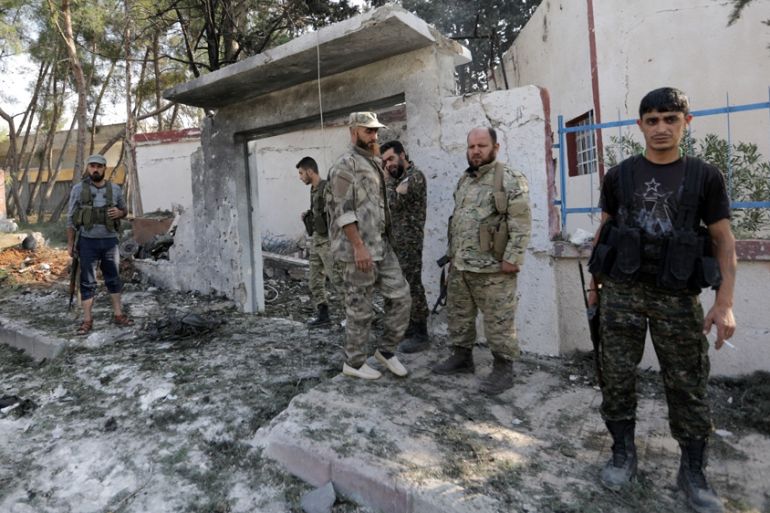Russia military police deploy in north Syria under truce deal
Russian, Syrian security forces aim to push Kurdish fighters back from the border as part of deal reached with Turkey.

Russian military police deployed on the streets of Syria‘s northeast border town of Kobane on Thursday under a deal with Turkey to drive out Kurdish fighters.
Moscow will send a further 276 military policemen and 33 units of military hardware to Syria in a week, Russia’s RIA news agency cited a defence ministry source as saying.
Keep reading
list of 3 itemsIs Russia the new power broker in Middle East?
Trump lifts US sanctions on Turkey, says ceasefire permanent
Their arrival marked the start of a mission by Russian and Syrian security forces to push Kurdish fighters 30km (19 miles) into Syria under an accord reached between Russian President Vladimir Putin and Turkish leader Recep Tayyip Erdogan.
Kobane is of special significance to Kurdish forces who fought off Islamic State of Iraq and the Levant (ISIL or ISIS) fighters trying to seize the city in 2014-15 in one of the fiercest battles of Syria’s conflict.
The Russia-Turkey deal on Tuesday sealed the return of Russia’s ally President Bashar al-Assad’s forces along the northeastern border for the first time in years. It also marked Moscow’s deepening influence in the region two weeks after the United States started to pull out forces from Syria.
“We note with satisfaction that the agreements reached in Sochi are being implemented,” Russia’s Interfax news agency quoted Russian Deputy Foreign Minister Sergei Vershinin as saying.
The balance of power in Syria’s years-long civil war has shifted significantly since Trump announced the withdrawal of US troops on October 6, allowing Turkish-backed forces to sweep in to attack Washington’s former Kurdish-led allies, the Syrian Democratic Forces (SDF).
Turkey paused its offensive last week under a US-brokered deal that called for the Kurdish People’s Protection Units (YPG), which form the backbone of the SDF, to withdraw. Ankara then secured Russian support this week for a wider deal requiring the YPG’s removal from the whole northeast border.
Ankara considers the YPG a “terrorist” group linked to the Kurdistan Workers Party (PKK), a Kurdish separatist group inside Turkey. The PKK is designated as a “terrorist group” by the United States and the European Union.
Russia and the Kurds
A complete pullout of the YPG from the area would mark a victory for Erdogan who has said he is seeking to create a “safe zone” for the return of millions of Syrian refugees.
Next Tuesday, Russian and Turkish forces will jointly start to patrol a 10km (6-mile) strip of land in northeast Syria where US troops had long been deployed along with their former Kurdish allies.
|
|
It was not immediately clear how the SDF withdrawal could be enforced.
Kremlin spokesman Dmitry Peskov warned Kurdish forces if they did not retreat, Syrian border guards and Russian military police would have to fall back.
“And remaining Kurdish formations would then fall under the weight of the Turkish army,” he said.
The Kurdish-led SDF was Washington’s main ally in the fight to dismantle ISIL’s self-declared “caliphate” in Syria.
‘Our forces are still clashing’
Despite Russian assurances that all sides were implementing the agreement, the SDF on Thursday accused Turkish-backed forces of attacking three villages “outside the area of the ceasefire process”, forcing thousands of civilians to flee.
“Despite our forces’ commitment to the ceasefire decision and the withdrawal of our forces from the entire ceasefire area, the Turkish state and the terrorist factions allied to it are still violating the ceasefire process,” a statement from the group said.
“Our forces are still clashing,” the statement said, urging the United States to intervene to halt the renewed fighting.
Turkey’s defence ministry did not respond directly to the claim, but said five of its military personnel had been wounded in an attack by the YPG militia around the border town of Ras al Ain, near where the three villages are located.
Turkey has previously said it reserves the right to self-defence against any militants who remain in the area despite the truce, a pledge repeated by Erdogan on Thursday.
“If these terrorists don’t pull back and continue their provocations, we will implement our plans for a (new) offensive there,” he said in a speech to local administrators.
Also on Thursday, an explosive-laden car detonated outside of the the headquarters of a militia of Syrian fighters allied to Turkey in Tal Abyad, a northeastern Syrian town taken by Turkish-backed forces during the cross-border offensive, according to Syrian state media.
The UK-based Syrian Observatory for Human Rights said four people were injured in the blast. There was no immediate claim of responsibility.
Following Turkey’s announcement that its offensive against the Kurdish forces was over, US President Donald Trump said on Wednesday the ceasefire it brokered last week was now permanent and he was lifting all sanctions imposed on Ankara.
Turkey’s military operation was widely condemned by its NATO and European Union allies, who said it was causing a new humanitarian crisis in Syria’s eight-year conflict and could allow ISIL prisoners being held by the YPG to escape and regroup.
|
|